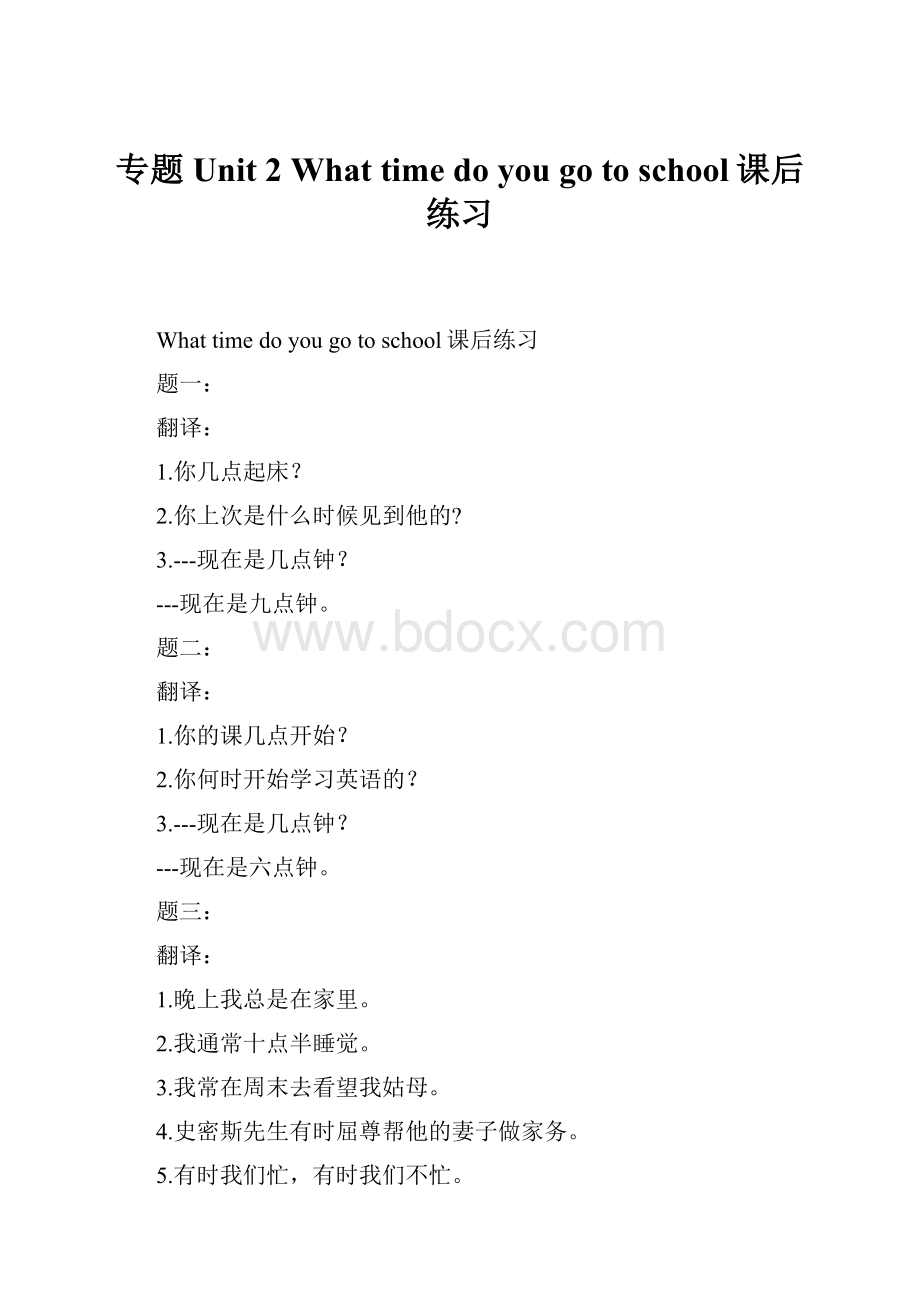专题 Unit 2 What time do you go to school课后练习.docx
《专题 Unit 2 What time do you go to school课后练习.docx》由会员分享,可在线阅读,更多相关《专题 Unit 2 What time do you go to school课后练习.docx(17页珍藏版)》请在冰豆网上搜索。

专题Unit2Whattimedoyougotoschool课后练习
Whattimedoyougotoschool课后练习
题一:
翻译:
1.你几点起床?
2.你上次是什么时候见到他的?
3.---现在是几点钟?
---现在是九点钟。
题二:
翻译:
1.你的课几点开始?
2.你何时开始学习英语的?
3.---现在是几点钟?
---现在是六点钟。
题三:
翻译:
1.晚上我总是在家里。
2.我通常十点半睡觉。
3.我常在周末去看望我姑母。
4.史密斯先生有时屈尊帮他的妻子做家务。
5.有时我们忙,有时我们不忙。
题四:
翻译:
1.我早餐总要吃一个鸡蛋。
2.我通常星期天购物。
3.约翰经常在晚上看电视吗?
4.我有时去那条河里游泳。
5.有时他会迟到。
题五:
翻译:
1.这个故事真有趣!
2.他们是多么好的孩子呀!
3.多么美味的食物呀!
4.刘翔跑得多快呀!
5.多么有趣的故事呀!
题六:
翻译:
1.这个姑娘真聪明!
2.多么漂亮的花呀!
3.多么大的雪呀!
4.他吉他弹得多好啊!
5.多么聪明的一个姑娘呀!
题七:
翻译:
1.他乘地铁到车站去。
题八:
翻译:
1.我们是骑自行车去那儿还是坐出租车去?
题九:
翻译:
1.我的孩子们今天想去游泳。
2.他爱好旅行。
3.每天晚饭之后我们都喜欢听新闻。
4.我听见有人笑。
题十:
翻译:
1.他很喜欢在这家书店买书。
2.他喜欢弹钢琴。
3.我们能通过无线电收听音乐。
4.你能听见一些动物的声音吗?
题十一:
翻译:
1.他明天到巴黎。
2.游客们是昨晚到达这里的。
题十二:
翻译:
1.他半夜才到达旅馆。
2聚会之后我很高兴回到了家。
题十三:
翻译:
1.感谢您的来信。
2.谢谢您把车借给我。
3.我想买一台新车。
4.今天我不想出门。
5.我想要一个大盒子。
题十四:
翻译:
1.感谢你可爱的礼品。
2.谢谢你来看我。
3.我要给一个朋友写封信。
4.我想和史密斯先生谈谈。
5.她想要一次休假。
题十五:
翻译:
1.他告诉了我他的计划。
2.我昨天给我母亲写了封信。
题十六:
翻译:
1.这事我以后再告诉你。
2.我将写信给我的兄弟。
题十七:
翻译:
1.我每天早晨六点起床。
2.他经常在操场上踢足球。
3.她吃得很多。
题十八:
翻译:
1.晚上他们常常一起读书。
2.汤姆有一本英语词典。
3.爸爸每个星期六都游泳。
题十九:
翻译:
1.______difficult questions they are!
I can’t answer them.
A. How B. How an C. What D. What an
2.---______ is it?
---It is half past eleven.
A.WhatB.WhattimeC.WhenD.How
3.Mike does his exercises ____ seven _____ the evening.
A. on; to B. at; in C. by; of D. at; on
4.Sheoften___supperbefore6:
30pm.
A.hasaB.eatC.haveaD.has
5.It’stime______myhomework.
A.doingB.doC.todoD.todoing
6.______,howcanIgettothebusstation?
A.SorryB.ExcusemeC.HiD.Hello
7.Does Tom often play _______ football after _______ school?
A. /;/ B. /;the C. the;/ D. a;/
8. I ______ speak Japanese. ______he speak Japanese?
A. do not;Does B. do not;Do C. does not;Do D. does not;Does
题二十:
翻译:
1.______well you sing but______badly he dances!
A. How, how B. What, what C. How,what D. What, how
2.---______ is it?
---It is four o’clock.
A.WhatB.WhattimeC.WhenD.How
3.He arrived______Shanghai ______9:
30 ______ March 5.
A. at; in;at B. to; on; at C. in; on; at D. in; at; on
4.Lilyoften______lunchathome.Butyesterdayshe______lunchatschool
A.have,hadB.has,hadC.has,haveD.hasa,hada
5.It’stime______theclassroom.
A.tocleanB.cleaningC.cleanedD.cleans
6.______,Mr.Green,mayIaskyouaquestion?
A.SorryB.HiC.ExcusemeD.Hello
7.After watching _____TV, she played ______violin for an hour.
A. /, / B. the, the C. the, / D. /, the
8. How ______ Mr. Brown _________ to America?
A. do,go B. is,go C. does,go D. does,goes
题二十一:
Samgets___1___atsixinthemorning,thenhe___2___ashowerandbrusheshis___3___.He___4___breakfastathome.Hegoestoschool___5___seven.Hehasfourclassesinthemorning.Hehaslunchatschool.Intheafternoon,hehastwoclasses.Afterclasshe___6___sports.At5:
30,hegoeshome.Aftersupper,he___7___hishomework.He___8___watchTVeveryevening.Heonly___9___TVonSaturdayevening.Heusually___10___bedatnine.
1.A.onB.offC.overD.up
2.A.takeB.takesC.doD.does
3.A.toothB.teethC.hairD.face
4.A.haveB.doesC.hasD.hasn’t
5.A.atB.inC.toD.for
6.A.doB.playsC.watchesD.play
7.A.goesB.doesC.hasD.did
8.A.canB.doesn’tC.neverD.want
9.A.watchB.watchesC.makeD.sees
10.A.makesB.gotoC.goestoD.getup
题二十二:
MycousinJerryis___1___thirteenyearsold,butheisagoodstudentandasuccessfulmusician.Heusually___2___upatsixten.Hehasbreakfastatseveno’clock.He___3___schoolatseventhirty.School___4___ataroundeighto’clock.Attwelveo’clock,hehasaquicklunchatschool.Afterlunch,heplays___5___guitarwithhisfriends.Theyare___6___playersinSchoolShow.
Jerryandhisfriends___7___inamusicclub.Afterschool,theytakethenumber102bustotheirclub.Intheclub,hehelpskidsplaytheguitartwo___8___.Heworksverywell.Thekids___9___himalot.Heusuallygetshomeataround6:
00p.m.Hehasdinnerwithhisparentsatsixthirty.Afterdinner,Jerryandhisparentslistentomusic,becausethey___10___lovemusic.Andtheygotobedataroundnine.
1.A.haveB.hasC.onlyD.more
2.A.goesB.doesC.sleepsD.gets
3.A.goestoB.gotoC.goesforD.gofor
4.A.playsB.classesC.startsD.puts
5.A.anB.aC.theD./
6.A.guitarB.pianoC.trumpetD.violin
7.A.isB.areC.haveD.has
8.A.hoursB.daysC.weeksD.years
9.A.loveB.needC.joinD.listen
10.A.veryB.allC.everyD.someone
Whattimedoyougotoschool
课后练习参考答案
题一:
1.Whattime doyougetup?
2.When didyouseehimlasttime?
3.---Whattime isit?
---Itisnineo’clock.
解析:
1.whattime意为“几点,什么时候”,用于提问几点几分。
2.when意为“何时,什么时候”。
3.Whattimeisit?
用来询问时间,意为“几点了”,用it作答。
相当于What’sthetime?
题二:
1.Whattime doesyourclassbegin?
2.When didyoubeginlearningEnglish?
3.---Whattime isit?
---Itissixo’clock.
解析:
1.whattime意为“几点,什么时候”,用于提问几点几分。
2.when意为“何时,什么时候”。
3.Whattimeisit?
用来询问时间,意为“几点了”,用it作答。
相当于What’sthetime?
题三:
1.I’m always athomeintheevenings.
2.I usually gotobedathalfpastten.
3.I often gotovisitmyauntatweekends.
4.Mr.Smith sometimes helpshiswifewiththehousework.
5.Sometimes wearebusyandsometimeswe’renot.
解析:
1.always“总是,永远”,为频率副词,表示动作重复,状态继续,中间没有间断,多放于系情助之后,实意动词之前。
2.usually“通常”,为频率副词,表示十之七八,着重已习惯的动作,有遵循常规的意思,多放于系情助之后,实意动词之前。
3.often“时常,经常”,为频率副词,表示十之五六,表示常常这样,但不总是这样,多放于系情助之后,实意动词之前。
4.sometimes“有时,不时”,为频率副词,表示十之一二,指某事只在某些场合会发生,并非在一切场合都发生,其位置比较灵活,可置于句首、句中、句末。
5.sometimes“有时,不时”,为频率副词,表示十之一二,指某事只在某些场合会发生,并非在一切场合都发生,其位置比较灵活,可置于句首、句中、句末。
题四:
1.I always haveaneggforbreakfast.
2.I usually goshoppingonSundays.
3.DoesJohn often watchtelevisionintheevening?
4.Igoswimminginthatriver sometimes.
5.Heis latesometimes.
解析:
1.always“总是,永远”,为频率副词,表示动作重复,状态继续,中间没有间断,多放于系情助之后,实意动词之前。
2.usually“通常”,为频率副词,表示十之七八,着重已习惯的动作,有遵循常规的意思,多放于系情助之后,实意动词之前。
3.often“时常,经常”,为频率副词,表示十之五六,表示常常这样,但不总是这样,多放于系情助之后,实意动词之前。
4.sometimes“有时,不时”,为频率副词,表示十之一二,指某事只在某些场合会发生,并非在一切场合都发生,其位置比较灵活,可置于句首、句中、句末。
5.sometimes“有时,不时”,为频率副词,表示十之一二,指某事只在某些场合会发生,并非在一切场合都发生,其位置比较灵活,可置于句首、句中、句末。
题五:
1.Whataninterestingstoryitis!
2.Whatgoodchildrentheyare!
3.Whatdeliciousfooditis!
4.How fast Liu Xiang runs!
5.Howinterestingastoryitis!
解析:
1.由what引导的感叹句,其句子结构可以是:
1.What+a/an+形容词+可数名词单数+陈述句(主语+谓语)!
2.由what引导的感叹句,其句子结构可以是:
2.What+形容词+可数名词复数+陈述句(主语+谓语)!
3.由what引导的感叹句,其句子结构可以是:
3.What+形容词+不可数名词+陈述句(主语+谓语)!
4.how也可以引导感叹句,how为副词,在感叹句中修饰动词,形容词或副词,常用语句子结构:
1.How+形容词/副词+陈述句(主语+谓语)!
5.how也可以引导感叹句,how为副词,在感叹句中修饰动词,形容词或副词,常用语句子结构:
2.How+形容词+a/an+单数可数名词+陈述句(主语+谓语)!
题六:
1.Whataclevergirlsheis!
2.Whatbeautifulflowerstheyare!
3.Whatheavysnowitis!
4.How well he plays the guitar!
5.Howcleveragirlsheis!
解析:
1.由what引导的感叹句,其句子结构可以是:
1.What+a/an+形容词+可数名词单数+陈述句(主语+谓语)!
2.由what引导的感叹句,其句子结构可以是:
2.What+形容词+可数名词复数+陈述句(主语+谓语)!
3.由what引导的感叹句,其句子结构可以是:
3.What+形容词+不可数名词+陈述句(主语+谓语)!
4.how也可以引导感叹句,how为副词,在感叹句中修饰动词,形容词或副词,常用语句子结构:
1.How+形容词/副词+陈述句(主语+谓语)!
5.how也可以引导感叹句,how为副词,在感叹句中修饰动词,形容词或副词,常用语句子结构:
2.How+形容词+a/an+单数可数名词+陈述句(主语+谓语)!
题七:
He took thesubwaytothestation./Hewenttothestationbysubway.
解析:
take+限定词+交通工具,表示“乘坐......”的意思,为动词词组,在句中作谓语;而by+交通工具,也有“乘坐......”的意思,但它是介词,介词短语作状语。
题八:
Shall we go there by bike or take a taxi?
解析:
take+限定词+交通工具,表示“乘坐......”的意思,为动词词组,在句中作谓语;而by+交通工具,也有“乘坐......”的意思,但它是介词,介词短语作状语。
题九:
1.Mychildren love togoswimmingtoday.
2.He loves traveling.
3.Eachnightafterdinnerweliketo listento thenews.
4.I heard someonelaughing.
解析:
1.lovetodosth.=liketodosth.意为“喜欢/愿意做某事”,强调具体活动,往往和具体时间或地点搭配。
2.lovedoingsth.=likedoingsth.“喜欢做某事”,强调习惯,常规行为。
3.listento“听......”,强调动作。
4.hear“听见/听到”,强调结果。
题十:
1.He loves tobuybooksinthisbookshop.
2.He loves playingthepiano.
3.Wecan listento musicbyradio.
4.Canyouhearsomeanimals?
解析:
1.lovetodosth.=liketodosth.意为“喜欢/愿意做某事”,强调具体活动,往往和具体时间或地点搭配。
2.lovedoingsth.=likedoingsth.“喜欢做某事”,强调习惯,常规行为。
3.listento“听......”,强调动作。
4.hear“听见/听到”,强调结果。
题十一:
1.HewillgettoParistomorrow.
2.Thevisitors got herelastnight.
解析:
1.get表示“到达”时,为不及物动词,后接地点名词时,要加介词to,后接副词时,不再加to。
2.get表示“到达”时,为不及物动词,后接地点名词时,要加介词to,后接副词时,不再加to。
here/there/home等为常用地点副词。
题十二:
1.Hedidn’tgettothehoteluntilmidnight.
2.Iwasgladto get homeafterparty.
解析:
1.get意为“到达”,后接地点名词时,要加介词to,后接副词时,不能加to。
2.get意为“到达”,后接地点名词时,要加介词to,后接副词时,不能加to。
here/there/home等为常用地点副词。
题十三:
1.Thanksforyourletter.
2.Thankyouforlendingmeyourcar.
3.I want tobuyanewcar.
4.Idon’t want togoouttoday.
5.I want alargebox.
解析:
1.thanks/thanksb.for…“因……而感谢某人”,for是介词,后跟名词、代词宾格或者动名词。
2.thanks/thanksb.for…“因……而感谢某人”,for是介词,后跟名词、代词宾格或者动名词。
3.wanttodo…表示“想要做某事”。
4.wanttodo…表示“想要做某事”。
5.want“想要”可以带名词或代词作宾语。
题十四:
1.Thanksforthelovelygift.
2.Thanksforcomingtoseeme.
3.I want towritealettertoafriend.
4.I want tohaveatalkwithMr.Smith.
5.She wants aholiday.
解析:
1.thanks/thanksb.for…“因……而感谢某人”,for是介词,后跟名词、代词宾格或者动名词。
2.thanks/thanksb.for…“因……而感谢某人”,for是介词,后跟名词、代词宾格或者动名词。
3.wanttodo…表示“想要做某事”。
4.wanttodo…表示“想要做某事”。
5.want“想要”可以带名词或代词作宾语。
题十五:
1.Hetoldmeabouthisplans.
2.I wrote mymotheraletteryesterday.
解析:
1.tellsb.aboutst